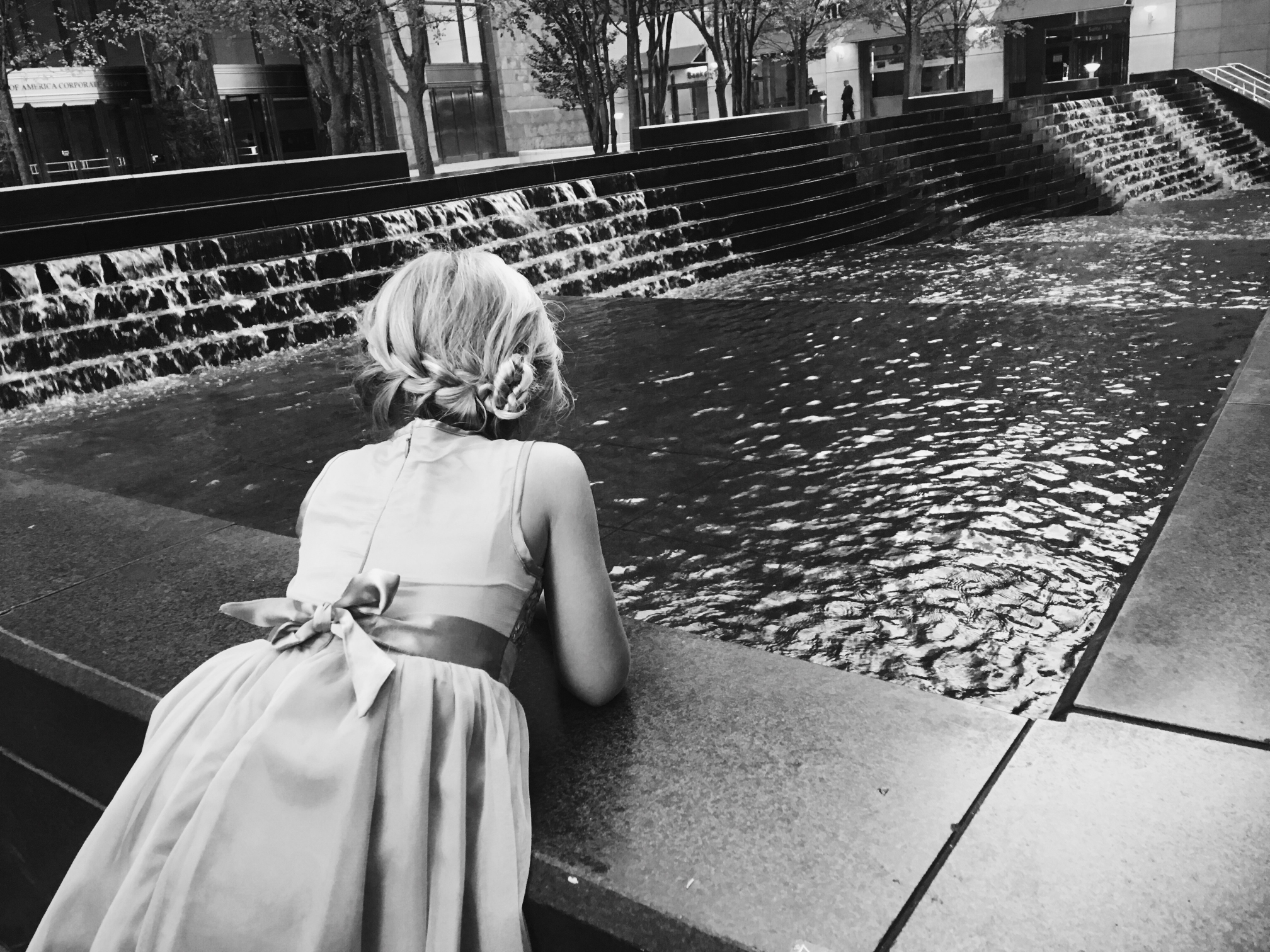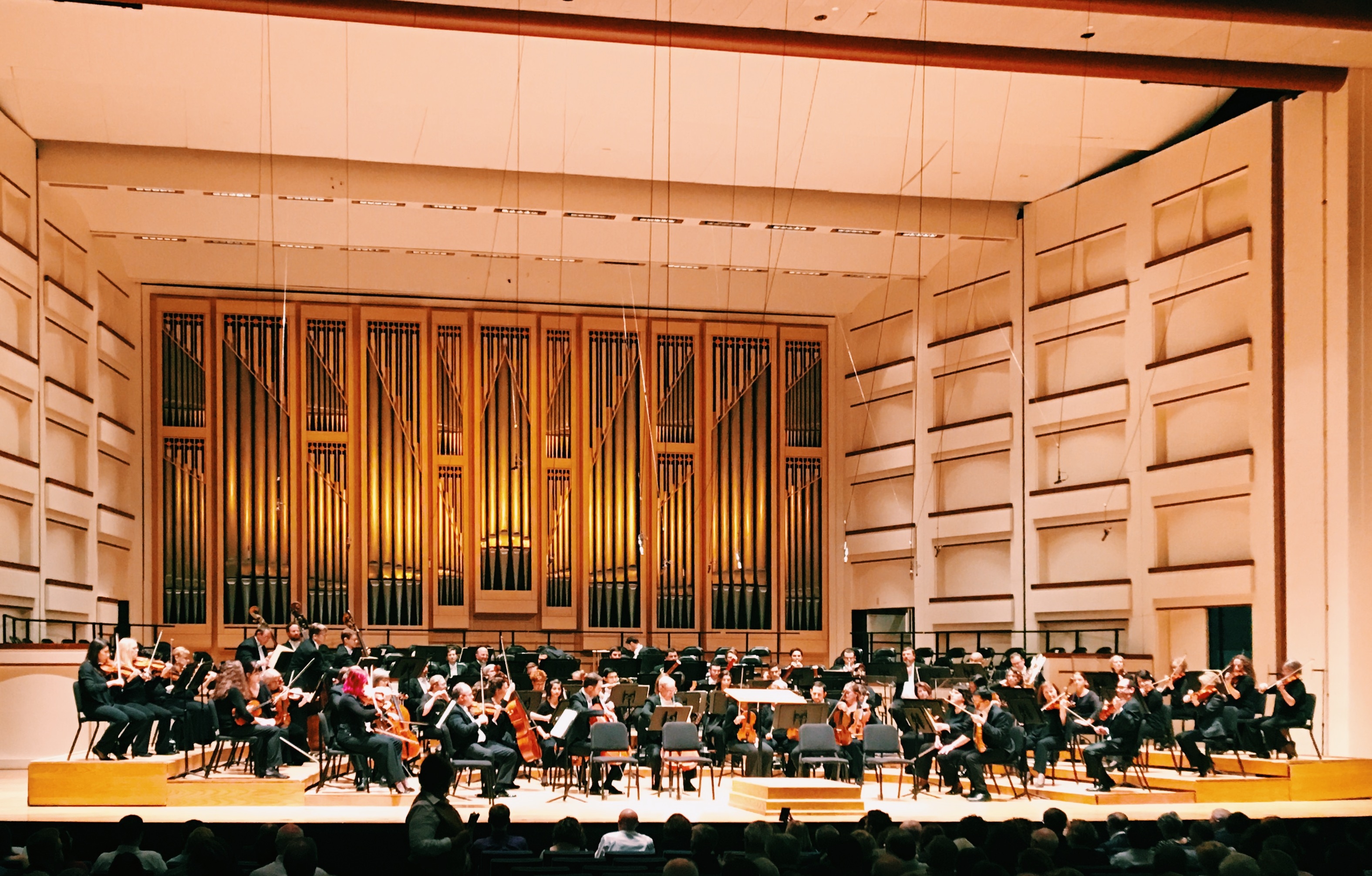From the time she was tall enough to reach the keys, we’ve watched Julia (and, later, Thomas and now Annie) reach up to pluck out a few notes on our piano. We keep the lid up–and, to be honest, we keep a piano–for that very purpose.
So it wasn’t as surprising as it was gratifying when Julia asked to take piano lessons. We’re both wary parents when it comes to burdening our kids with our own ideas of hobbies or interests–we learned that lesson, to an extent, with t-ball, which Julia soldiered through in spite of her easy to spot boredom.
She’s a natural on the piano, though, and she sits down daily to practice without us even reminding her. She raced through her first and second and third piano books, and by the end of the summer was picking out the melody of “Ode to Joy.” When I saw the Charlotte Symphony Orchestra was presenting Beethoven’s Ninth Symphony, I knew we had to go.
The Ninth falls into the category of “pop” classical music; it’s a regular fan favorite, a way for symphonies to fill their auditoriums with paid ticket holders and pad their revenue to offset other, more obscure concerts. The CSO doesn’t play it often, and for good reason: it’s easy for a grandiose performance to require not only the full symphony of musicians but also a chorale numbering into the hundreds.
Julia wore a new, bright pink dress for the occasion, and I slipped on a sports jacket. The drive into the city was punctuated by Julia’s fascination with tall buildings. Uptown Charlotte was full and noisy as cities ought to be–the thrum of traffic, horses pulling carriages full of tourists, young folks, dressed for a night out, laughing as they wander in and out of bars. We walked a few blocks to The King’s Kitchen, a Jim Noble restaurant known for its classic southern cooking, and ate outside, stuffing ourselves with pot roast and black-eyed peas and green beans and biscuits and apples.

Soon it was time to walk back to the Blumenthal for the show. We’d gotten seats at the end of a row–helpful for Julia to see–and I explained the curious traditions of an orchestral performance: the cacophony as the musicians, all on stage, independently warmed up and practiced; the gathering silence as the lights dimmed; the concertmaster tuning the orchestra, one section at a time; the earnest applause as conductor Christopher Warren-Green took the podium.
The Ninth is dear to me, its four parts like four friends. I kept the symphony loaded on my iPad when I traveled for work, returning to it frequently as an escape from a crowded airplane’s middle seat. As the baton fell on the opening notes, I knew what to expect–but I was even happier to see Julia sit straight up, her eyes prowling the stage in search of what she was hearing.
“I like watching this conductor,” I whispered into Julia’s ear. She leaned her head out into the aisle for a better look. Me too, she whispered back.
Christopher Warren-Green, an Englishman who not only has conducted private performances for the Royal family but directed the music at both Prince Charles’s and Prince William’s weddings, is captivating to watch. His British reserve is punctuated by moments where he seems to viscerally grab the music from the players, his entire body, from his fists to his crown of white hair, shaking from the effort.
It’s not as though he’s fighting his players–more that he is rapturing them into an enlightenment only he can see.
In the final movement, the strains of “Ode to Joy” tip-toe out of the cello and double bass strings, and eventually the melody explodes from the full orchestra. At that moment, Warren-Green stopped conducting, his arms spread wide, his baton pointed down as the music washing over him. He stayed like that for several measures before prodding the next cue.
If you read about the Ninth Symphony, you’ll learn how Beethoven wrote it in his final years. It is his life’s summation. When the piece was first performed, Beethoven had grown so deaf that when it was over he wasn’t aware the audience had leapt to its feet in thunderous applause. The groundbreaking Ninth was the first symphony to introduce a chorus singing with the instrumentalists.
And in that final movement, which begins with the anxiety of a horse on the verge of bolting, the sorrowful and somber chords are interrupted by a tenor, who firmly insists
Oh, friends! Not these sounds.
Let us instead strike up more pleasing
and more joyful ones.
My tired daughter sat up once more as hundreds of voices pealed down from their risers, their German enunciation crisp and bright. And though she didn’t understand the words they sang, she sensed–along with the rest of us–that something extraordinary was happening. In its final minute, the music lingers, taking one more chance to relish in the beauty of the moment before it takes off in a race to the final note.
And then it was over, and the audience leapt to its feet, and Julia was clapping big, wide claps, and the applause lasted through three curtain calls.
When Christopher Warren-Green first came onstage, he introduced the evening’s performance by noting it had been a year since the civic unrest, riots, and demonstrations that followed the police shooting of Keith Lamont Scott.
I was in Vermont when that happened, traveling for work. I’d come back to the hotel for dinner, sitting at the lobby bar while all three of the televisions played images shot from helicopters circling the Queen City. It was emotionally difficult to see a sea of rioters along streets and landmarks that I knew well–and to witness it all from a hotel hundreds of miles away. I remember engaging in a conversation with two other men, out-of-towners, who preempted any discussion with a firm statement that the rioters were in the wrong. They’d had more drinks than I had, and it didn’t seem prudent to try to add nuance to what was unfolding before us on national television.
After two nights of violence, the Charlotte Symphony cancelled its planned performance and scheduled instead a “Performance for Peace” that would be broadcast live. By then, I’d driven back to Boston and was waiting in the airport for my flight back to Charlotte.
It was a moral call, Warren-Green said of the need to perform art in the wake of tragedy and unrest. I streamed the concert through my headphones, listening through the familiar and inspiring lineup: “Fanfare for the Common Man,” “Lincoln Portrait,” and “Amazing Grace.” By the end of the performance, I found myself homesick and quietly weeping among a crowd of strangers at Logan Airport.
One year to the day later, as Warren-Green took the stage to conduct Beethoven’s Ninth, he not only marked the anniversary of those difficult events, he noted how appropriate Beethoven’s final symphonic work was in these divisive times, when joy seems hard to come by.
No more sorrowful music, he said. Let us strike up more joyous sounds, sounds that accompany us on the longest journey: from the head to the heart.
Joy, beautiful spark of divinity,
daughter from Elysium,
we enter, burning with fervor,
heavenly being, your sanctuary!
Your magic brings together
what custom has sternly divided.
All men shall become brothers,
wherever your gentle wings hover.


Leave a Reply